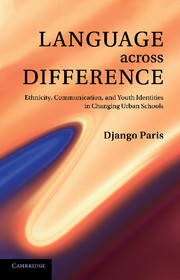Book contents
- Frontmatter
- Contents
- Figures
- Tables
- Acknowledgments
- 1 Beginnings: shouts of affirmation from South Vista
- 2 ‘Spanish is becoming famous’: youth perspectives on Spanish in a changing youth community
- 3 ‘True Samoan’: ethnic solidarity and linguistic reality
- 4 ‘They’re in my culture, they speak the same way’: sharing African American Language at South Vista
- Interlude : on oral language use, research, and teaching in multiethnic schools
- 5 ‘You rep what you’re from’: texting identities in multiethnic youth space
- 6 Making school go: re-visioning school for pluralism
- Appendix: Notes on methodology in cultural studies of language across difference
- Notes
- References
- Index
1 - Beginnings: shouts of affirmation from South Vista
Published online by Cambridge University Press: 05 August 2011
- Frontmatter
- Contents
- Figures
- Tables
- Acknowledgments
- 1 Beginnings: shouts of affirmation from South Vista
- 2 ‘Spanish is becoming famous’: youth perspectives on Spanish in a changing youth community
- 3 ‘True Samoan’: ethnic solidarity and linguistic reality
- 4 ‘They’re in my culture, they speak the same way’: sharing African American Language at South Vista
- Interlude : on oral language use, research, and teaching in multiethnic schools
- 5 ‘You rep what you’re from’: texting identities in multiethnic youth space
- 6 Making school go: re-visioning school for pluralism
- Appendix: Notes on methodology in cultural studies of language across difference
- Notes
- References
- Index
Summary
It’s our culture, we have to …
– From an interview with CarlosTrue Hamoz gurl fo lyph {True Samoan Girl For Life}
– From a text written on Ela’s backpackBlacks, Mexicans, and Polynesians; we all gotta stay together …
– From an interview with MilesIn an essay written near the end of his life and career, Pulitzer Prize winning playwright August Wilson (2000) described the motivation at the heart of his cycle of epic dramas which depict the Black experience in twentieth-century America. Wilson wrote that his characters are “continually negotiating for a position, the high ground of the battlefield, from where they might best shout an affirmation of the value and worth of their being in the face of a many-million-voice chorus that seeks to deafen and obliterate it” (p. 14). What Wilson sought to reveal in his work were these shouts of affirmation, shouts of identity and cultural worth in the face of the vastness of oppression. I seek similar revelations in this book. I seek to reveal how Carlos’s belief that the cultural ways of his community had to be voiced, Ela’s statement of her eternal Samoaness, and Miles’ sentiment of shared marginalization were shouts of affirmation in the face of a dominant society that did not highly value the youth I worked with. Beyond the considerable task of revealing youth strivings for voice, and self, and power, I also seek to understand how the processes of these strivings worked in a changing multiethnic youth community to challenge and reinforce lines of ethnic and linguistic difference. Further still, my goal is to show the ways this understanding can help us re-vision language and literacy learning in schools.
- Type
- Chapter
- Information
- Language across DifferenceEthnicity, Communication, and Youth Identities in Changing Urban Schools, pp. 1 - 23Publisher: Cambridge University PressPrint publication year: 2011



